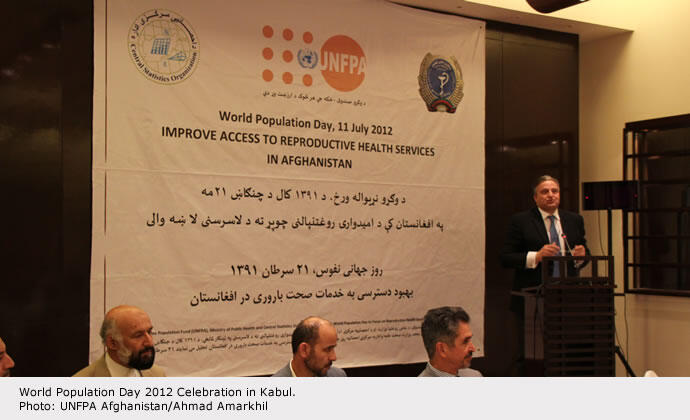Kabul, 11 July - The United Nations Population Fund (UNFPA) celebrates the World Population Day 2012 with the support of the Ministry of Public Health (MoPH) and Central Statistics Organization (CSO) of Afghanistan.
Each year, World Population Day focuses attention on the urgency and importance of population and reproductive health, particularly in the context of overall development, and the need to address these issues. With world population surpassing 7 billion, we have an opportunity to accelerate progress towards one fundamental goal: Universal Access to Reproductive Health Services, which is the theme of World Population Day 2012.
"Delivering a, world where every pregnancy is wanted, every childbirth is safe and every young person's potential is fulfilled is the United Nations Population Fund vision; UNFPA Afghanistan is committed to support afghan women and men to fulfill their reproductive rights and to address the health inequities between rural and impoverished women and urban area" states Dr. Laurent Zessler, UNFPA Afghanistan Representative.
Reproductive health problems remain the leading cause of ill health and death for women of childbearing age worldwide. And because women are often the backbones of their families, these problems can affect the well-being of the whole family. Universal access to voluntary family planning services, access to pre- and antenatal care, skilled attendance at all births, and timely emergency obstetric care when complications arise can prevent almost all maternal deaths and greatly reduce injuries of childbearing. Too often, affordable, effective medicines and health supplies do not reach the women and young people who need them most.
In Afghanistan, despite relevant progresses obtained in the past ten years, 2/3 of women still give birth at home without a midwife or skilled attendant; more than half of the women under age 20 have no education and maternal mortality is still unacceptably high. According to the Afghanistan Mortality Study 2010, the Maternal Mortality Ratio is 327/100.000.
"Improve the quantity and the quality of maternal and reproductive health services in Afghanistan is one of the highest priorities of the Ministry of Public Health. We also know that traditions constitute many barriers to women accessing health services. Afghanistan is a patriarchal society where men are the main decision makers in the community and at home; furthermore women's mobility restrictions impedes their ability to seek care. We know that women who marry early, living in remote areas with limited access to emergency obstetric care, women in low income groups with malnutrition and high fertility and women with no education are more at risk of dying in pregnancy and childbirth. These challenges are affecting the entire country and require a multi-sector approach" is the message by Minister of Public Health, Dr. Suraya Dalil, to celebrate the World Population Day 2012.
The Central Statistics Organization of Afghanistan is committed to support the process to achieve Universal Access to Reproductive Health by providing reliable and disaggregated data to support present and future reproductive health policies and programmes.
"To celebrate the World Population Day 2012 we want to share a simple as much as meaningful statistics: a year of schooling for a girl reduces her children's mortality rate by 5 to 10 percent. With five years of school, her children are 40 percent more likely to live past age 5" states HE Mr. Abdul Rehaman Ghafoori, CSO President General.
In the wake of the interest generated by the Day of 5 Billion, celebrated on 11 July 1987 (25 years ago), the United Nation General Assembly recommended that 11 July be observed annually as World Population Day. This year's theme was chosen to re-energize commitments towards universal access to reproductive health and recognize those who provide information, services and supplies. Target 5b of the Millennium Development Goals is to "Achieve Universal Access to Reproductive Health by 2015." Years earlier, the International Conference on Population and Development (ICPD) had also called for universal access by 2015 to reproductive health care, including voluntary family planning, assisted childbirth and prevention of sexually transmitted infections, including HIV.


